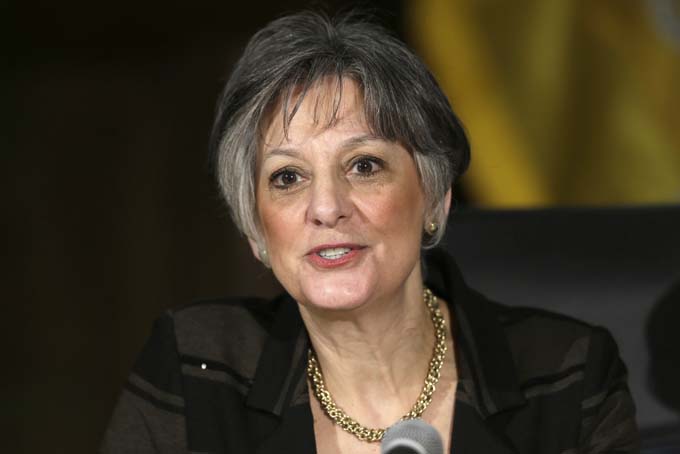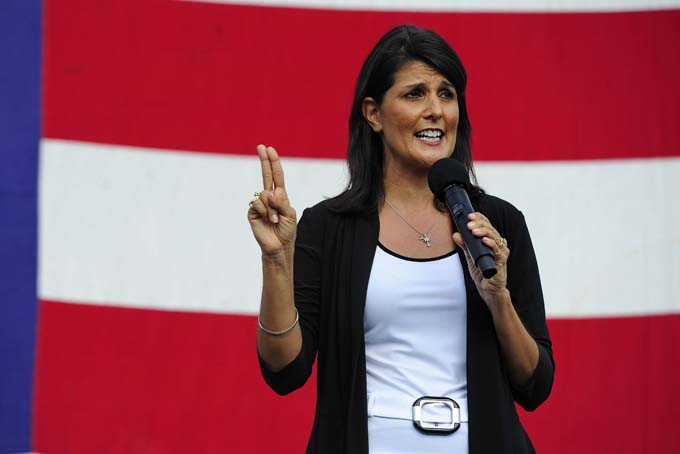
NEW YORK (AP) — The Democratic Party claims to be the natural home for women.
The numbers tell another story when it comes to the nation’s governors.
Republicans, four women: Jan Brewer in Arizona, Susana Martinez in New Mexico, Mary Fallin in Oklahoma and Nikki Haley in South Carolina. Democrats: Maggie Hassan in New Hampshire.
For the GOP, often accused of waging a “war on women,” this advantage offers a powerful tool in the competition for female voters.
“We have to show the fact there is no war on women,” said Nikki Haley, who’s in her first term. “The more Republican women out there, the better our case is.”
Democratic leaders, backed by national women’s groups, are trying to turn it around in gubernatorial elections next fall that feature no less than six high-profile female candidates. Their goal is to give Hassan, who faces re-election in 2014, some company.
“My mother always used to say if you want something done, ask a busy woman,” says Rhode Island’s treasurer, Gina Raimondo, a 42-year-old mother of two young children who began her campaign last week. “People in Rhode Island want someone who’s going to do something.”
Raimondo is a leading contender in the crowded Democratic primary to succeed Lincoln Chafee, the Democratic incumbent who’s not running for a second term.
In Massachusetts, Pennsylvania, Wisconsin and Texas, there also are strong female candidates.
Gender is not a central issue in theses contests, but the Democratic women are using their backgrounds to help distinguish themselves.
Several candidates interviewed by The Associated Press said that the real-world stresses of raising families help them connect with voters, while shaping their priorities on issues such as health care, education and jobs.
In some cases, they’re up against male incumbents who elevated women’s issues by backing conservative social priorities on abortion, contraception and “equal pay” legislation.
In Pennsylvania, Democratic U.S. Rep. Allyson Schwartz charges that Republican Gov. Tom Corbett has “almost been dismissive of women,” particularly on issues such as “access to family planning and reproductive rights.”
Corbett has drawn criticism for cutting education, and like other Republican governors, supported legislation requiring women to get ultrasounds before having abortions. That idea never became law, but Corbett did say that women should close their eyes if they felt the procedure was too obtrusive.
“It is important for us in Pennsylvania to see a new and different kind of leadership that will move the state forward. It may well take a woman to do that,” Schwartz told a recent gathering of Pennsylvania politicians in New York City. She’s considered the early front-runner in the primary.
In state and national elections, women are a powerful voting bloc.
In presidential races, a Republican candidate has not won a majority of women since 1984. In the 2010 congressional elections, however, exit polls found that women voted for Republicans and Democrats almost evenly, helping to propel the GOP to the U.S. House majority.
Since then, Republicans have suffered from several self-inflicted wounds. For example, in 2012, Republican Senate candidate Todd Akin of Missouri suggested that women’s bodies could prevent impregnation in cases of “legitimate rape.”
A report from the Republican National Committee this year detailed the scope of the problem. “Women are not a ‘coalition.’ They represent more than half the voting population in the country, and our inability to win their votes is losing us elections,” it said.

Republicans such as South Carolina’s Haley are in a unique position to balance damage done from party leaders elsewhere.
“Women can’t help it when men say ignorant things,” she said. “What we can do is try to make sure we continue to refocus people on what’s important and back on the issues.”
Haley, Martinez and Fallin are running for re-election in 2014. Brewer hasn’t decided whether she will challenge term limits set in the Arizona Constitution.
Democrats lost two female governors in recent years when President Barack Obama appointed Arizona’s Janet Napolitano and Kansas’ Kathleen Sebelius to his Cabinet.
None of the Democrats’ 2014 female candidates are considered sure bets.
In Republican-friendly Texas, Democratic strategists are skeptical about the chances of state Sen. Wendy Davis, who developed a national following after her filibuster of a Republican-backed abortion bill.
Massachusetts Attorney General Martha Coakley is trying to become the state’s first female governor elected in a general election. Raimondo and Schwartz are trying to become their states’ first female chief executive, as is Wisconsin businesswoman Mary Burke.
Burke is the likely challenger for Republican Gov. Scott Walker, who has pursued social conservative priorities on women’s issues as he weighs a 2016 presidential bid.
“There are a lot of areas where women in the state aren’t getting a fair shake,” Burke said.
Burke cited Walker’s repeal of legislation designed to deter employers from wage discrimination based on age and gender. Walker also signed into law legislation that singled out abortion clinics in requiring their doctors to have admitting privileges at nearby hospitals, which would reduce the number of abortion providers.
___
Associated Press Director of Polling Jennifer Agiesta in Washington contributed to this report.